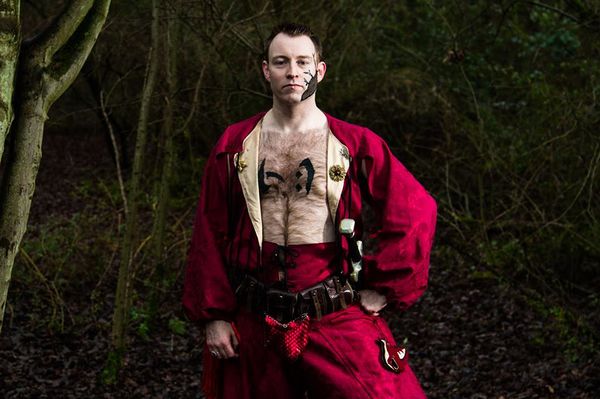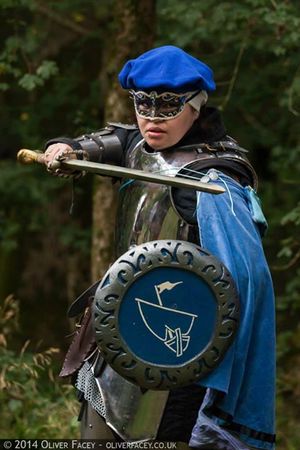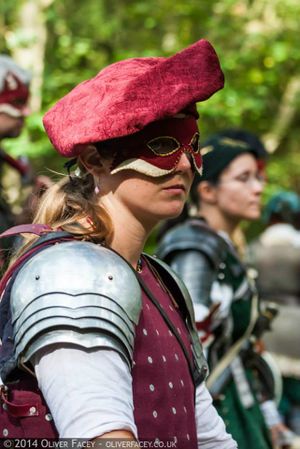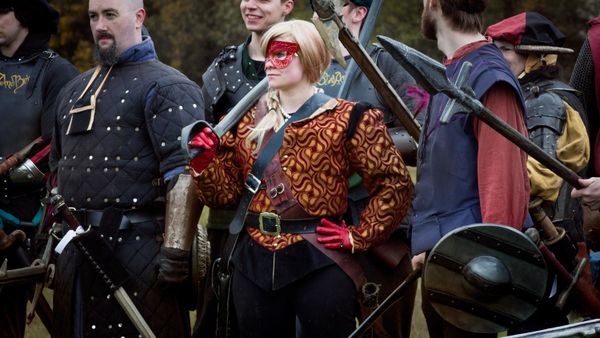Bravo
No edit summary |
mNo edit summary |
||
| (30 intermediate revisions by 6 users not shown) | |||
| Line 1: | Line 1: | ||
<quote-right by="Basidi de Verrario, Private Letters">When employing soldiers, their possession of good manners is slightly less important than their ability to regurgitate cooked lobsters.</quote-right> | <quote-right by="Basidi de Verrario, Private Letters">When employing soldiers, their possession of good manners is slightly less important than their ability to regurgitate cooked lobsters.</quote-right> | ||
{{CaptionedImage|file=HeavyBravo.jpg |title=Some people claim it is impossible to look good in heavy armour ...|caption=Magdalena di Tassato Regario, Bravo at large|width=300|align=right}} | |||
==Overview== | |||
Bravos represent the warriors and soldiers of League society. They are people of any gender committed to fighting, usually as part of a [[Free company]]. | |||
==Military heritage== | |||
Many bravos start as ruffians, thugs and even petty criminals on the streets of [[The League]] cities. They come to the attention of a [[free company]] or [[guild]] through a combination of bravado and raw talent. Aping the attitudes of the free companies, gangs of aspiring bravos engage in fights and acts of petty vandalism and disobedience. Some end up dead, some end up falling foul of the law and some are lucky enough to attract the attention and patronage of a guild or free company. Even those who fall foul of the law may find themselves in a free company - it is a common punishment for unruly folk with some level of chutzpah to be sentenced to life as a soldier of the League. | |||
== Military | |||
Many | |||
Bravos are | Bravos are people known for their swagger. Their behaviour is loud and loutish - they drink, carouse and fight among themselves when they are off duty. They are not simply thugs - they are unruly and boisterous, but they reserve their violence for each other and members of rival free companies. When they are in the field, an element of this ''braggadocio'' remains, but it is tempered by the seriousness of war. | ||
The behaviour of off-duty | The behaviour of off-duty bravos is seen as an useful safety valve - an opportunity for fighting folk to blow off a little steam. They often refer to being "''at licence''" - they literally are given permission by their commanding officer to squander their money while gambling, drinking and fighting as long as they remember that they are representing the honour of their free company. As long as nobody is killed or permanently maimed, and as long as property damage is kept within manageable limits, the rest of League society tends to turn a blind eye. | ||
{{CaptionedImage|file=CarabellaBarossa.jpg|title=Many bravos start as ruffians, but with the right guidance they become so much more.|caption=Bravos are known for their swagger.|width=300|align=left}} | |||
This unruly, swaggering behaviour serves a dual purpose. In addition to relaxing or blowing off steam, it serves as an advertisement for the free company. If a drunken brawl results in one free company trouncing the bravos of another, the victors are more likely to win lucrative contracts. By the same token, if a bravo murders someone or shows disrespect for the rules, it reflects badly on the entire free company and the likelihood of employment is reduced. In a way, it is a military expression of the same drive that causes other citizens of The League to engage in displays of wit and savoir faire - it keeps them sharp, and leaves others in no doubt as to their skills. | |||
In many cases, the reputation of a band of bravos is enough to ensure that their employer is untroubled. In part, a free company is often paid to be larger than life, and even bravos stationed in a city to protect the interests of a merchant prince are likely to spend some time being seen, and ensuring everyone remembers their reputation and skill with casual violence. | |||
If a band of bravos - or more than one band - damages property or possessions, it is traditional for their commanding officer to ensure that all losses are covered in cash by the next evening. Provided the payment is forthcoming, magistrates are generally not involved. If more than one band of bravos is involved, it is traditional for each company to offer full payment, meaning that when two bravos smash up an inn or brothel, the owner ends up with twice as much money as the damage that has been done, further discouraging the populace from complaining about the behaviour of the bravos. | |||
All of this can occasionally cause problems when a free company comes into contact with a military unit from another Nation. Soldiers and warriors from outside The League are often unaware of the unwritten rules of bravo behaviour and mistake an invitation to a brawl for a serious threat to life and limb. | |||
==Bridge Duelling== | |||
Some of the competition is more obvious to an outsider. Bridge Duelling is a popular sport between bravos, a sport often credited as a satire of the relations between the twin cities of Tassato. One team will stake out an area as their 'bridge' and challenge all comers who wish to cross it. This culminates in a grand series of duels where competitors fight for ribbons. Duellists can choose to stake a number of ribbons from their collection against each other, but a greater number are often won from admirers in the crowd who applaud flamboyance, wit and style as much as combat prowess. In keeping with the masked nature of the festival, it is common for combatants to adopt a persona and announce themselves under a name chosen for the occasion, rather than their own. | |||
==Creating a bravo== | |||
Bravos are fighting people, first and foremost. The most common way to play a bravo is to design a [[free company]]. Free companies move around, and so bravos may come from any part of the League, or even beyond. A bravo is likely to still feel some loyalty to their city of their birth however, and balancing loyalty to your city and your free company could create interesting tension for your character. | |||
{{CaptionedImage|file=LuizCabreyra.jpg|title=Being a briar provides ample opportunity to be insulted, and thus start some ruckus ...|caption=Bravos are expected to be boastful, larger-than-life figures who display a cocky and swaggering attitude.|width=600|align=right}} | |||
Almost all bravos fight. Younger bravos tend to focus on combat skills, while officers and older bravos may pick up a few other areas of interest. | |||
Free companies often include members who are not bravos, especially medical characters, and are likely to have at least one character who handles contracts and money. These characters may or may not buy into the bravo lifestyle. | |||
It is possible to play a bravo who is not part of a free company. The swagger and ''bragadoccio'' of the bravos is adopted by warriors all over The League, and the personal guards of a merchant prince or [[bishop]], the streetwise protectors of a [[mountebank]] or even the boisterous "stage hands" of a [[troupe]] of magicians can all be interesting options for a bravo. | |||
==Playing a bravo== | |||
Bravos are expected to be boastful, larger-than-life characters, who display a cocky and swaggering attitude. They squander their money gambling and having a good time, and take advantage of the informal attitudes of The League to cause a little trouble. They brag about their successes, sometimes exaggerating them out of all proportion, and disparage the achievements of other soldiers to goad them into a fight. At the same time, though, they know on some level that they only get away with this because it is largely harmless, and because they make up for any bad feelings they might cause by being relatively disciplined soldiers when it comes to the crunch. | |||
== Playing | |||
Bravos are expected to be boastful, larger-than-life characters, who display a cocky and swaggering attitude. They squander their money gambling and having a good time, and take advantage of the informal attitudes of | |||
Being able to provide the rough and dirty insult that sparks off a fight between rivals is a valuable skill for a bravo, but there is a line between having fun and being offensive. The violence that bubbles below the surface of a Bravo should still be used as an excuse to roleplay with others rather than slip into out-of-character bullying. | Being able to provide the rough and dirty insult that sparks off a fight between rivals is a valuable skill for a bravo, but there is a line between having fun and being offensive. The violence that bubbles below the surface of a Bravo should still be used as an excuse to roleplay with others rather than slip into out-of-character bullying. | ||
{{CaptionedImage|file=The Bravo.jpg|caption=A bravo never passes up an opportunity to show off.|width=600|align=left}} | |||
The idea that the bravos are walking advertisements for their free companies extends even to those who are part of other group structures - by displaying the right attitude, you drawn attention to your merchant prince, troupe or bishop. By the same token, if you are a criminal it reflects badly on your companions. | |||
The | The bravo should rarely pass up an opportunity to show off. Actively challenge other bravos to contests of physical prowess and combat skill, and feel free to extend this attitude to warriors from other Nations. If you discover that a certain bunch of [[The Marches|Marcher]] yeomen likes to sit at a certain table in the bar, occupy it with your friends and challenge them to make you move. If you find out that a certain [[Dawn|Dawnish]] knight likes a quiet cup of tea at a [[Highguard]] teahouse, crash their party and see if their companions have the stones to ask you to leave. | ||
When it comes to the battlefield, keep the attitude but remember that at the end of the day you need to survive and defeat your enemies to be taken seriously. | When it comes to the battlefield, keep the attitude but remember that at the end of the day you need to survive and defeat your enemies to be taken seriously. | ||
Some of the early scenes from ''The Three Musketeers (1973)'' film, between the musketeers and the Cardinal's Men, capture the spirit of competing | Some of the early scenes from ''The Three Musketeers (1973)'' film, between the musketeers and the Cardinal's Men, capture the spirit of competing bravos, as do any number of other military-themed films featuring larger-than-life characters full of machismo up to and including the space-station brawls in ''Starship Troopers'' or the rough interplay of the marines in ''Aliens''. | ||
[[Category:The League]] | [[Category:The League]] | ||
[[Category:Archetype]] | |||
Latest revision as of 13:38, 8 September 2025
When employing soldiers, their possession of good manners is slightly less important than their ability to regurgitate cooked lobsters.
Basidi de Verrario, Private LettersOverview
Bravos represent the warriors and soldiers of League society. They are people of any gender committed to fighting, usually as part of a Free company.
Military heritage
Many bravos start as ruffians, thugs and even petty criminals on the streets of The League cities. They come to the attention of a free company or guild through a combination of bravado and raw talent. Aping the attitudes of the free companies, gangs of aspiring bravos engage in fights and acts of petty vandalism and disobedience. Some end up dead, some end up falling foul of the law and some are lucky enough to attract the attention and patronage of a guild or free company. Even those who fall foul of the law may find themselves in a free company - it is a common punishment for unruly folk with some level of chutzpah to be sentenced to life as a soldier of the League.
Bravos are people known for their swagger. Their behaviour is loud and loutish - they drink, carouse and fight among themselves when they are off duty. They are not simply thugs - they are unruly and boisterous, but they reserve their violence for each other and members of rival free companies. When they are in the field, an element of this braggadocio remains, but it is tempered by the seriousness of war.
The behaviour of off-duty bravos is seen as an useful safety valve - an opportunity for fighting folk to blow off a little steam. They often refer to being "at licence" - they literally are given permission by their commanding officer to squander their money while gambling, drinking and fighting as long as they remember that they are representing the honour of their free company. As long as nobody is killed or permanently maimed, and as long as property damage is kept within manageable limits, the rest of League society tends to turn a blind eye.
This unruly, swaggering behaviour serves a dual purpose. In addition to relaxing or blowing off steam, it serves as an advertisement for the free company. If a drunken brawl results in one free company trouncing the bravos of another, the victors are more likely to win lucrative contracts. By the same token, if a bravo murders someone or shows disrespect for the rules, it reflects badly on the entire free company and the likelihood of employment is reduced. In a way, it is a military expression of the same drive that causes other citizens of The League to engage in displays of wit and savoir faire - it keeps them sharp, and leaves others in no doubt as to their skills.
In many cases, the reputation of a band of bravos is enough to ensure that their employer is untroubled. In part, a free company is often paid to be larger than life, and even bravos stationed in a city to protect the interests of a merchant prince are likely to spend some time being seen, and ensuring everyone remembers their reputation and skill with casual violence.
If a band of bravos - or more than one band - damages property or possessions, it is traditional for their commanding officer to ensure that all losses are covered in cash by the next evening. Provided the payment is forthcoming, magistrates are generally not involved. If more than one band of bravos is involved, it is traditional for each company to offer full payment, meaning that when two bravos smash up an inn or brothel, the owner ends up with twice as much money as the damage that has been done, further discouraging the populace from complaining about the behaviour of the bravos.
All of this can occasionally cause problems when a free company comes into contact with a military unit from another Nation. Soldiers and warriors from outside The League are often unaware of the unwritten rules of bravo behaviour and mistake an invitation to a brawl for a serious threat to life and limb.
Bridge Duelling
Some of the competition is more obvious to an outsider. Bridge Duelling is a popular sport between bravos, a sport often credited as a satire of the relations between the twin cities of Tassato. One team will stake out an area as their 'bridge' and challenge all comers who wish to cross it. This culminates in a grand series of duels where competitors fight for ribbons. Duellists can choose to stake a number of ribbons from their collection against each other, but a greater number are often won from admirers in the crowd who applaud flamboyance, wit and style as much as combat prowess. In keeping with the masked nature of the festival, it is common for combatants to adopt a persona and announce themselves under a name chosen for the occasion, rather than their own.
Creating a bravo
Bravos are fighting people, first and foremost. The most common way to play a bravo is to design a free company. Free companies move around, and so bravos may come from any part of the League, or even beyond. A bravo is likely to still feel some loyalty to their city of their birth however, and balancing loyalty to your city and your free company could create interesting tension for your character.

Almost all bravos fight. Younger bravos tend to focus on combat skills, while officers and older bravos may pick up a few other areas of interest.
Free companies often include members who are not bravos, especially medical characters, and are likely to have at least one character who handles contracts and money. These characters may or may not buy into the bravo lifestyle.
It is possible to play a bravo who is not part of a free company. The swagger and bragadoccio of the bravos is adopted by warriors all over The League, and the personal guards of a merchant prince or bishop, the streetwise protectors of a mountebank or even the boisterous "stage hands" of a troupe of magicians can all be interesting options for a bravo.
Playing a bravo
Bravos are expected to be boastful, larger-than-life characters, who display a cocky and swaggering attitude. They squander their money gambling and having a good time, and take advantage of the informal attitudes of The League to cause a little trouble. They brag about their successes, sometimes exaggerating them out of all proportion, and disparage the achievements of other soldiers to goad them into a fight. At the same time, though, they know on some level that they only get away with this because it is largely harmless, and because they make up for any bad feelings they might cause by being relatively disciplined soldiers when it comes to the crunch.
Being able to provide the rough and dirty insult that sparks off a fight between rivals is a valuable skill for a bravo, but there is a line between having fun and being offensive. The violence that bubbles below the surface of a Bravo should still be used as an excuse to roleplay with others rather than slip into out-of-character bullying.
The idea that the bravos are walking advertisements for their free companies extends even to those who are part of other group structures - by displaying the right attitude, you drawn attention to your merchant prince, troupe or bishop. By the same token, if you are a criminal it reflects badly on your companions.
The bravo should rarely pass up an opportunity to show off. Actively challenge other bravos to contests of physical prowess and combat skill, and feel free to extend this attitude to warriors from other Nations. If you discover that a certain bunch of Marcher yeomen likes to sit at a certain table in the bar, occupy it with your friends and challenge them to make you move. If you find out that a certain Dawnish knight likes a quiet cup of tea at a Highguard teahouse, crash their party and see if their companions have the stones to ask you to leave.
When it comes to the battlefield, keep the attitude but remember that at the end of the day you need to survive and defeat your enemies to be taken seriously.
Some of the early scenes from The Three Musketeers (1973) film, between the musketeers and the Cardinal's Men, capture the spirit of competing bravos, as do any number of other military-themed films featuring larger-than-life characters full of machismo up to and including the space-station brawls in Starship Troopers or the rough interplay of the marines in Aliens.


